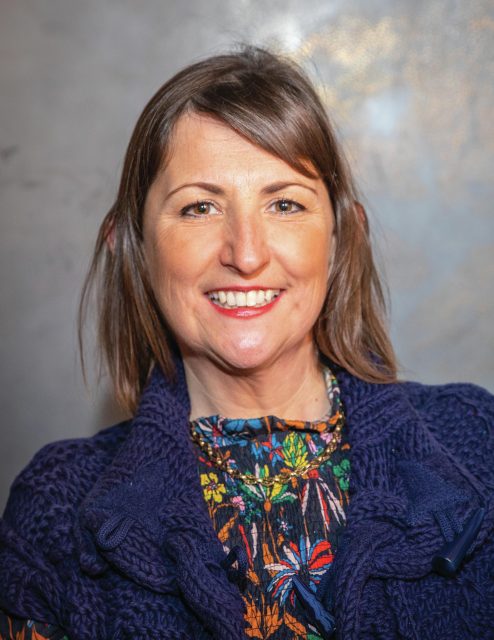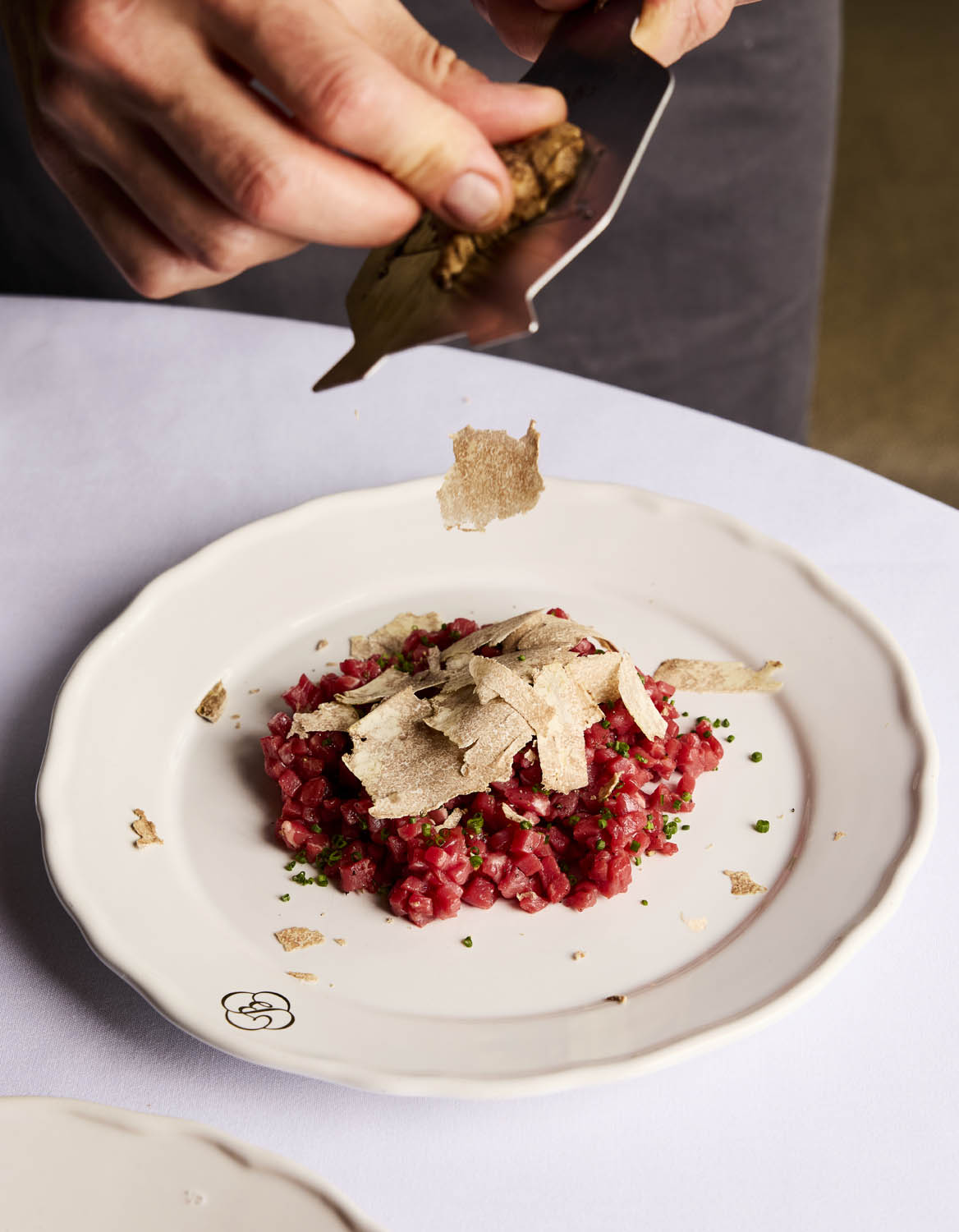The Big Interview: Hannah Tovey
London Wine Fair’s event director Hannah Tovey on why the capital is a launchpad for trends, and what comes next for English wine.

All eyes will swivel towards London this month as the UK’s biggest wine fair returns to the capital and producers prepare to show off their drinks like belles at a debutante ball to eligible members of the trade. It is also likely to be the first time that London Wine Fair (LWF) director Hannah Tovey, having had a slalom of obstacles to contend with in recent years, will be able to expel a long-held breath.
This time last year, Tovey was scrambling to change the fair’s usual May dates and rebook exhibitors following a hammer blow announcement. In late January ProWein had revealed that it would be moving its own show to May as a way of sidestepping the worst of the Covid-19 variants that threatened to disrupt travel. At the time of the date clash Tovey made no bones about the fact that she felt “confused, bemused, and angry”, telling the drinks business that she saw the move as “an extremely aggressive assault on both the London Wine Fair and the UK drinks market”.
With LWF having been cancelled in 2020 as a result of the pandemic, and held as a digital-only event in 2021 due to continued lockdowns, will 2023 finally be the year the fair goes off without a hitch?
“We have one opportunity per year to bring the entire trade together in London and create our shop window for the world,” Tovey says. “London is strongly recognised as a launchpad and a leader, and people look to us for that.”
To mark the fair’s return on 15-17 May, Tovey has supersized LWF’s offering, setting her team the ambitious target of staging not only the “greenest” trade fair in the world but also, and by no mean feat, the “most intelligent”.
DIGITAL CONNECTIVITY
In this particular context, Tovey explains, ‘intelligence’ alludes to both the calibre of education and discussion that will take place at the event and also to the level of digital connectivity that will be available to attendees.
“What makes LWF stand out from other drinks events is the incredible amount of content we have,” says Tovey. “It’s one of the things we excel at. Other events simply can’t match us for the sheer volume we have in terms of what’s going on, with more than 80 sessions taking place over three days. These talks and masterclasses are, well, I hate to use the term ‘world-beating’ because the Tories have completely destroyed that phrase, but they are truly special.”
Running through the core of LWF 2023 like the all-important layer of jam in a Victoria sponge is the theme of sustainability, with a planet-friendly focus permeating every crevice of the event.
“After we announced that sustainability would be the focus for the fair, there were a few weeks where we’d never experienced such an influx of organisations getting in touch, wanting to tell us what they are doing in that space,” says Tovey.
“But so many were saying the same things. We had to be brutally honest and question whether relaying this or that brand’s green achievements would help the wider industry to better itself. I was also conscious that it would be a tragedy if the event itself didn’t stand up to sustainable scrutiny, which gave rise to the idea of bringing together different entities and asking them to collaborate with each other to create something completely new.”
As a result, The Porto Protocol Foundation, a non-profit organisation founded by Taylor Fladgate Port, is teaming up with the Sustainable Wine Solutions Company in London (and 17 other stakeholders) to make sure every bottle at LWF is collected and reused.
“We will produce a report at the end of the show – the first report of its kind – looking at the opportunities and challenges of bottle reuse rather than recycling,” Tovey tells db. At the time of writing, her team has only just been given the go-ahead after tirelessly mapping out the minutiae of how they will facilitate the reuse of around 30,000 bottles.
“It has taken a huge team, and a lot of planning, right down to details such as the right receptacles for used bottles to go into at the show,” says Tovey. “Formerly, it didn’t matter if bottles got smashed because they were going to be broken down and turned into sand during the recycling process anyway. But you can’t have broken bottles for reuse so we’ve had to approach the process in a completely different way.” There will also be a comprehensive cork-collection programme at the event.

It’s a sign of the times, Tovey says, when exhibitors at the fair are “more passionate about what they bottle in, rather than what’s in the bottle”. She says the number of exhibitors interested in showing off their green packaging, often more so than the product itself, has “increased tenfold”, which Tovey believes “speaks volumes” about the seismic shift towards sustainable design.
“The people who have been talking to me the most this year have all been in the field of sustainable packaging. The stuff that’s finding me is all centred around that topic. And the people that are passionate about this area are quite a force to be reckoned with. They want to be heard,” she says. While Tovey welcomes thoughts and ideas from those producers who are already involved with green issues, she says that she would equally like to hear more from those companies that perhaps aren’t so green-minded, or at least aren’t yet. “I’d like to be able to get their messages and priorities across too, but I’m not hearing it so loudly,” she says.
Partner Content
It’s a shame, Tovey feels, that some of the more “old-school” vintners don’t seem to recognise the fair as “a platform to be seen as a proactive, engaged member of the industry”.
And while she won’t be drawn on who, or to which category such producers might belong, one thing is abundantly clear: Tovey keenly wants LWF to be a mouthpiece for all.
A WIN FOR THE PLANET
Of course, it’s slim coincidence that there is a surge in brands suddenly extolling the virtues of packaging their wines in paper bottles when the cost of glass has rocketed and the material has become famously hard to get hold of. But for Tovey, the motive is less important than the result. “We know that people don’t always act entirely altruistically, but if the end result is the same then it’s still a win for the planet,” she says.
That said, even the most caustic cynic cannot fail to spot that the innovations belonging to this year’s fair extend well beyond paper bottles. With LWF striving to be the most “intelligent” trade fair in the world, its organisers drew from the lessons they learned from staging the fair as a digital-only event in 2021.
“It’s not just about bringing together more than 10,000 people but about how you can connect with them, and how they can connect with each other,” says Tovey. “We learned that there are enormous opportunities to be had from harnessing online events both before and after LWF.” For this reason, ahead of this year’s fair, event organisers will open up a ‘Digital Dashboard’, through which guests can organise their diaries.
“People will be able to exchange information and conversations in the lead-up to the event,” says Tovey. “And if they input their objectives for visiting the show, the algorithm will match them up with the best people to help enrich their experience. It’s a bit like a dating app. The dashboard will provide a list of suggested matches and guests can either ask to set up a meeting on site with those matches at the physical fair, or schedule a video meeting for whenever suits. This might be between a buyer and a wine producer or between a certain association and a visitor who is looking to join that association. It’s pretty smart.”
As ever, English wineries will be the beating heart of the fair, with more represented than ever this year. At the time of writing, 11 English wine brands have signed up to exhibit their still and sparkling wines.
Like many in the trade, Tovey is still reeling at the news that WineGB’s CEO, Simon Thorpe, has stepped down after just three years in the role to join importer Thornton Hunt as its managing director.
“I was quite surprised, and sad. Simon is a lovely chap, and has been a delight to interact with. He’s clearly a very committed, intelligent and genuinely nice person, and I wish him well,” says Tovey, who remains on standby to discover who will step into Thorpe’s shoes. “It’s entirely critical who that person is,” she insists.
“Clearly, with the rapid growth of English wine we need to see a direct correlation when it comes to its marketing and brand development. We have a unique opportunity to produce some of the best wines in the world and present them to global markets. Whoever is the very best at doing that should be the new head of WineGB.”
When db interviewed Thorpe last year, he spoke about the existing framework for carving up English wine into Protected Designation of Origins (PDOs), and whether these would ultimately turn out to be a help or a hindrance to the industry.
“I’d hate to sit so far on the fence that it’s up my bottom but I can see it from both sides,” says Tovey. “Any kind of fixed parameters are going to stem creativity in English wine, but the benefit lies in being able to stress the idea of typicity and build a brand for these regional, distinctive wines.
“That said, I’ve never had to be a winemaker working within those limited parameters, and something about it doesn’t feel entirely British. But overall, I would say I am more for PDOs than I am against.”
With the stratospheric growth of English wine in recent years, Tovey believes the sector can help open doors for other categories in the UK drinks trade. “
If you asked anyone five or 10 years ago to talk about British drinks, all you heard was the word ‘gin’ on repeat. But after the feverish buying up of land and vineyards in the UK, one of the biggest things we can smile about is the rise in British wine production,” she says.
“I do think the English wine industry has a responsibility to lead, and to advance the conversation about UK drinks as a whole.”
The looming issue of wine tourism in the UK is another hot topic. With visiting a British pub top of the list for many international visitors, how can we get them to check out an English winery?
“I think more strategic partnerships between English wineries and either pubs or restaurants could be a really good step forward,” says Tovey. “There has to be a role there to play for WineGB in terms of encouraging wineries to get their products to a partner pub or pubs where people can discover their wines. Perhaps from there people will be inspired to branch out and visit the wineries.”
It’s back to that shop window again. And there is no better window dresser than the woman behind the London Wine Fair.
Related news
Behind the label: Alto Adige and the question of language





